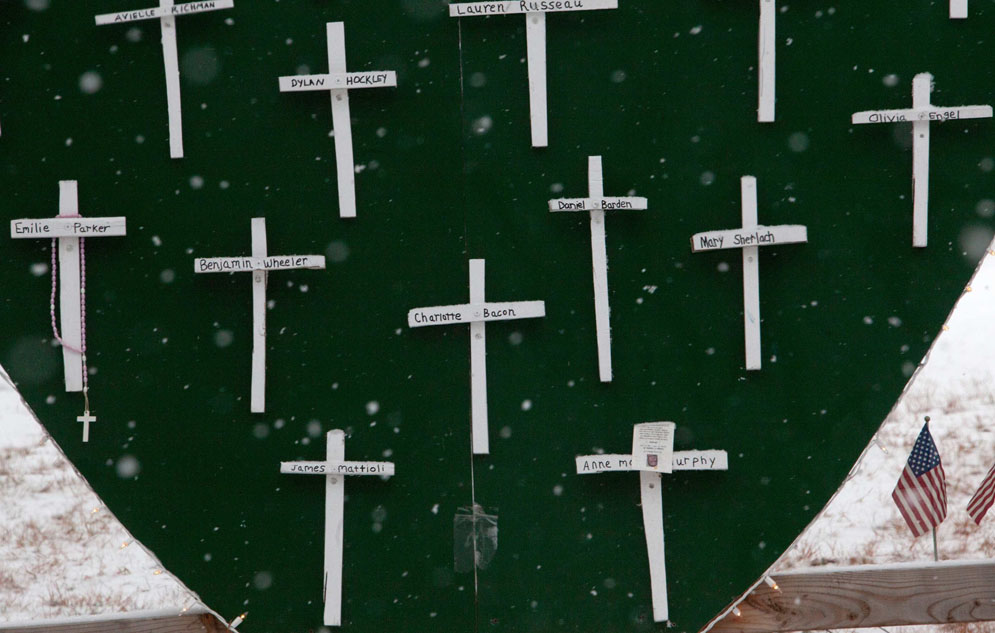
Snowflakes float over part of a memorial for the victims of the Sandy Hook Elementary School shooting in Newtown, Conn., Dec. 14, 2013, the first anniversary where 20 children and six adults were killed by gunman Adam Lanza. (CNS/Michelle McLoughlin, Reuters)
Carolyn Winfrey Gillette is a composer who wishes her music was not so popular.
One of her works, titled "If We Just Talk of Thoughts and Prayers," is a biblically based response to politicians who, after every gun massacre, do nothing but send best wishes and empty piety to survivors.
In the wake of the mass shooting at a school Feb. 14 — Ash Wednesday — in Parkland, Florida, Gillette posted the lyrics to that hymn and others on her Facebook page. As of Feb. 28, the post had reached over 438,340 people.
The song notes: "If we just talk of thoughts and prayers, and don't live out a faith that dares, and don't take on the ways of death, our thoughts and prayers are fleeting breath."
Available on her website at http://www.carolynshymns.com, interest in Gillette's music has surged after the litany of killings tied to American places: Orlando, Las Vegas, Newtown, and Charleston, now joined by Parkland.
It's not that Gillette doesn't believe in prayer. With her husband, Bruce, she is a pastor of Overbrook Presbyterian Church in Philadelphia. Most of her hymns are based upon the Sunday Scripture readings, and are popularly sung in Presbyterian churches as well as some Catholic churches. Her music has been included in a Catholic hymnal distributed in Australia. They were sung in Catholic churches in Kentucky after a recent school shooting there, and at events in the Diocese of San Jose, California. The lyrics are her own, with the music borrowed from traditional hymns familiar to Presbyterians.
"I believe in prayer and that we should be praying. But we should not stop there," she told NCR in a recent phone interview.
After many of the school shootings since Columbine in 1999, Gillette has written musical responses. At that point, she wrote "God We Have Heard It." There have been so many shootings, she now only needs to recycle some of her older works. The message does not need to change. That is what she finds infuriating and disheartening.
"I have written so many of them, unfortunately," she said. "It has taken off because of this. It's once again struck a nerve." When it comes to uttering "thoughts and prayers" after mass shootings, unaccompanied by any action, "people are tired of hearing it," she said.
Her lyrics cite Scriptural texts such as James 2, Matthew 21: 24-27 and Isaiah 58, where believers hear a God who can get pretty ticked off, calling out the faithful who practice empty religious piety without action.
Gillette has been at Overbrook for little more than a year. Previously, she and her husband pastored churches in New Jersey and Delaware. She has written more than 400 hymns, some with pointed political messages on issues such as world hunger and immigration, others with specific church messages, including 10 hymns on Ash Wednesday themes alone.
Advertisement
The theme of her politically tinged hymns is that there is no contradiction between the sanctuary and the street when it comes to changing social policies that go against Gospel values.
Her "Abraham Journeyed to a New Country" brings together biblical themes of migration with the current immigration debates. Gillette has been to Honduras more than a dozen times on church mission projects, and talked to parents who send their children north to flee the criminal violence there. She said a congregant told her last summer that the hymn changed her mind on the issue. For Gillette, that is good news that her music is having an impact.
She also has written in praise of Laudato Si', Pope Francis' encyclical on care for creation.
She said her genre remains church music, not protest songs. They are offered free-of-charge for use in churches of all types.
Her bottom line message: surely, Christians should pray, but they need to get politically involved, as well. "If we don't follow through on what we say we believe, it's just talk," she said.
If Christians are supposed to struggle against evil in the world, there is perhaps no more clear example than gun control right now, she said. Children across America now fear going to school. "That is oppression," she said.
[Peter Feuerherd is a correspondent for NCR's Field Hospital series on parish life and is a professor of journalism at St. John's University, New York.]
We can send you an email alert every time The Field Hospital is posted. Go to this page and follow directions: Email alert sign-up.








